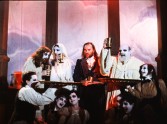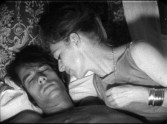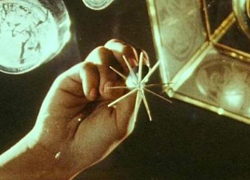
Salome
Macbeth
Two years before Carmelo Bene’s over-the-top version, Schroeter made his own film adaptation of Oscar Wilde’s play. He staged it in an ancient amphitheater in Lebanon, using the German translation by Hedwig Lachmann that Richard Strauss also used as the libretto for his famous opera. The film itself is a straightforward documentation, as if the camera were in the audience, watching the actors on stage. The staging is elegantly simple, as if the play were a Greek tragedy: there are no sets or furniture, and the costumes are flowing garments in muted colors. Nevertheless, the riveting performances by key members from Schroeter’s stock company bring to flaming life Wilde’s parable of innocent decadence becoming corrupt experience.
Schroeter adapted Shakespeare’s tragedy for German television, ruthlessly abridging the text to an hour’s length and staging everything on one highly theatrical set. He also took snippets from Verdi’s operatic version and used them to replace some of the missing scenes. After alternating between theater and opera, Schroeter finally fuses the two near the end, when his actors sing Verdi’s score, with untrained voices, to the accompaniment of a tango band. The broadcast received a chilly reception, but Schroeter was unrepentant: “I do not differentiate between kitsch and culture.”
























